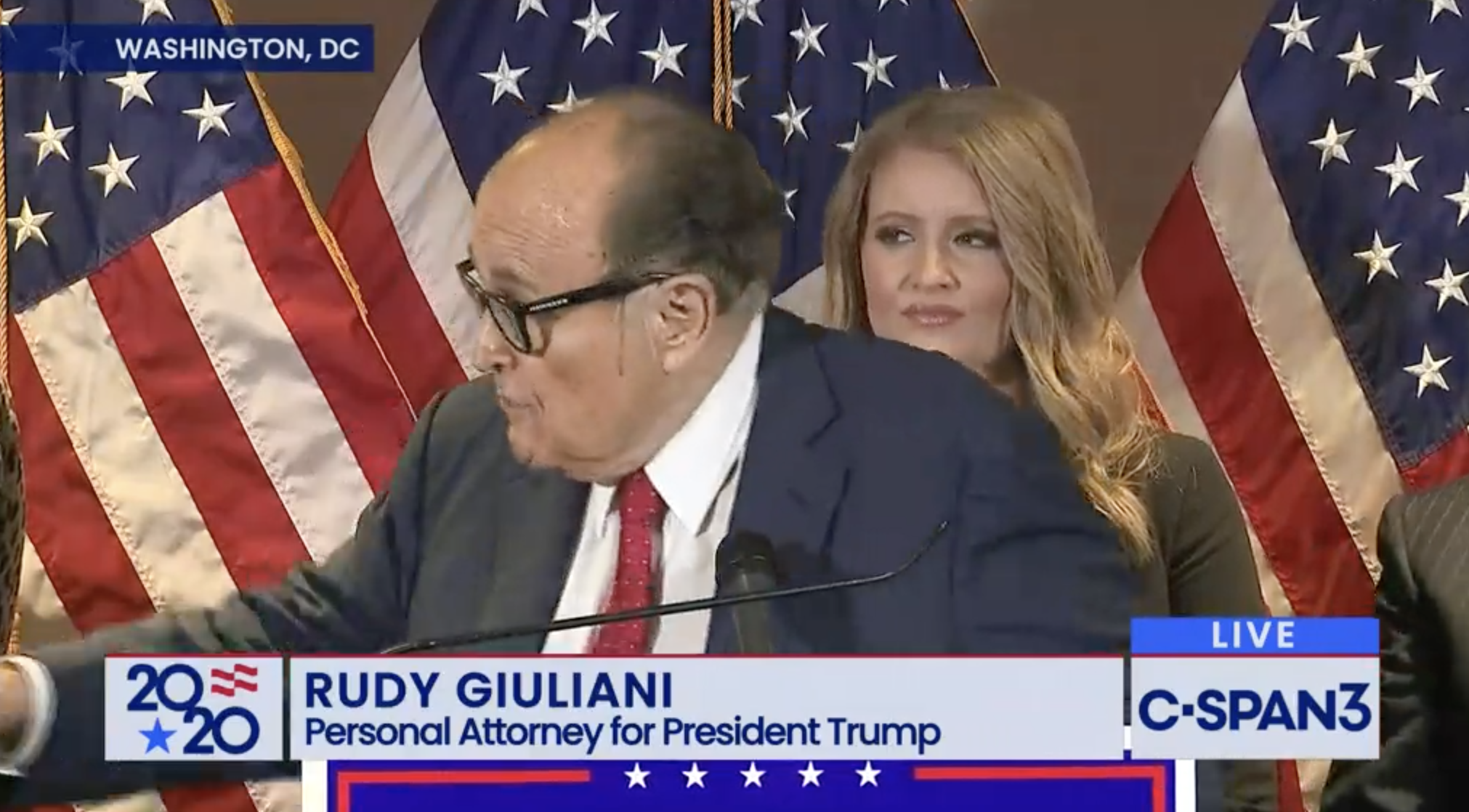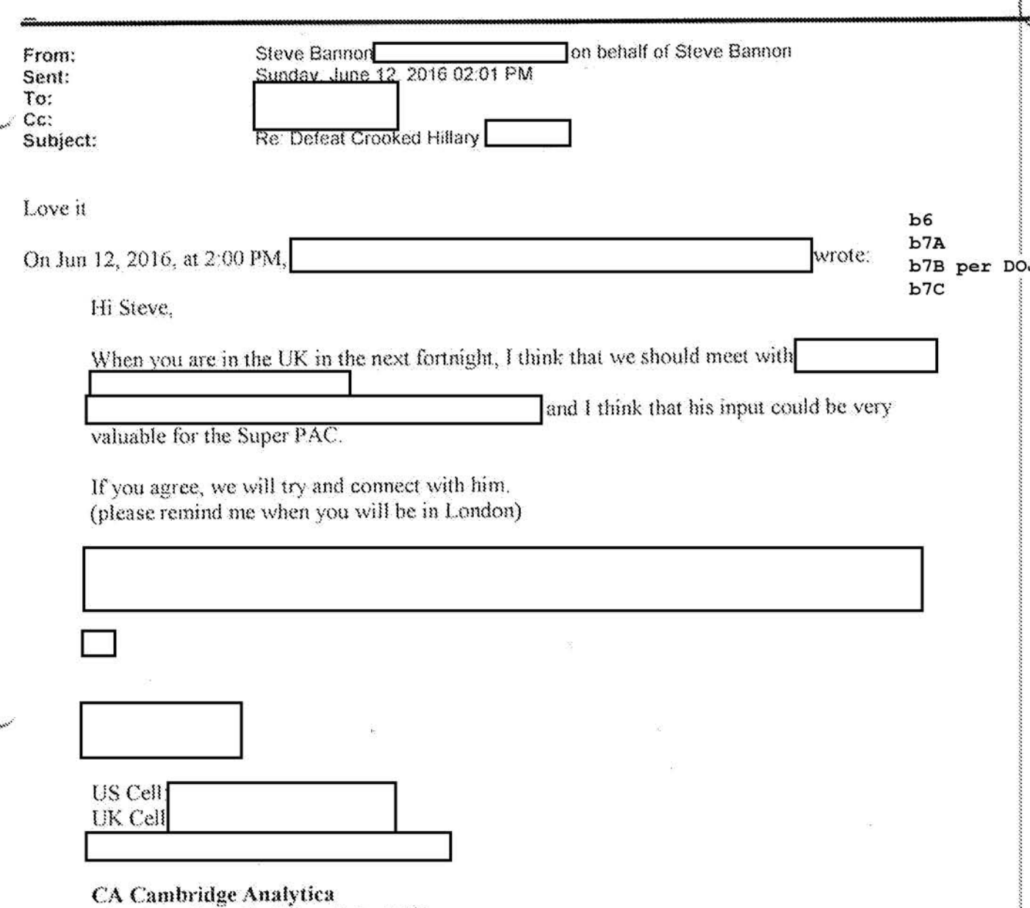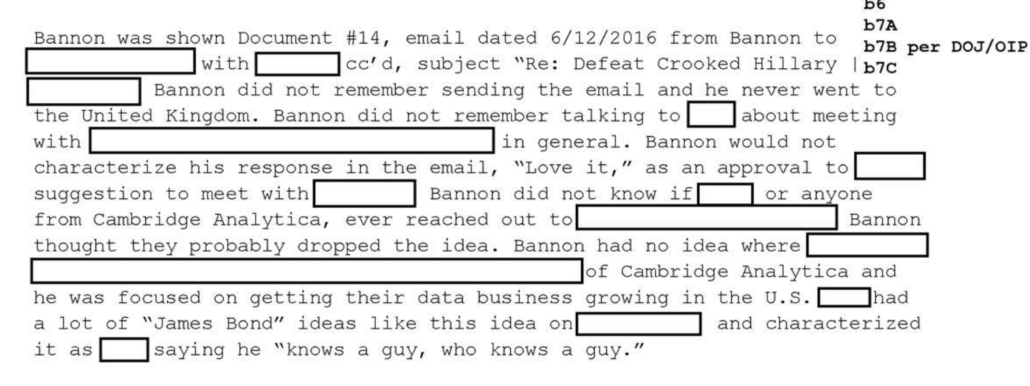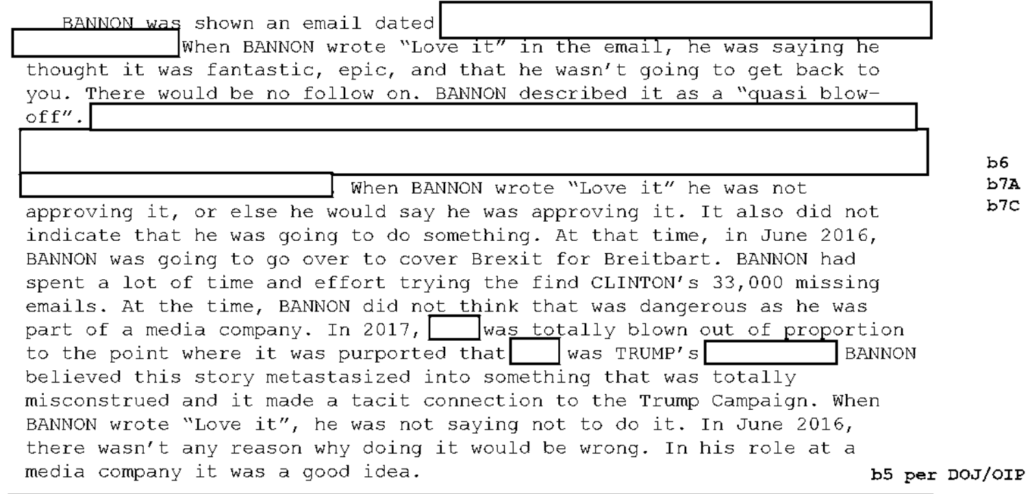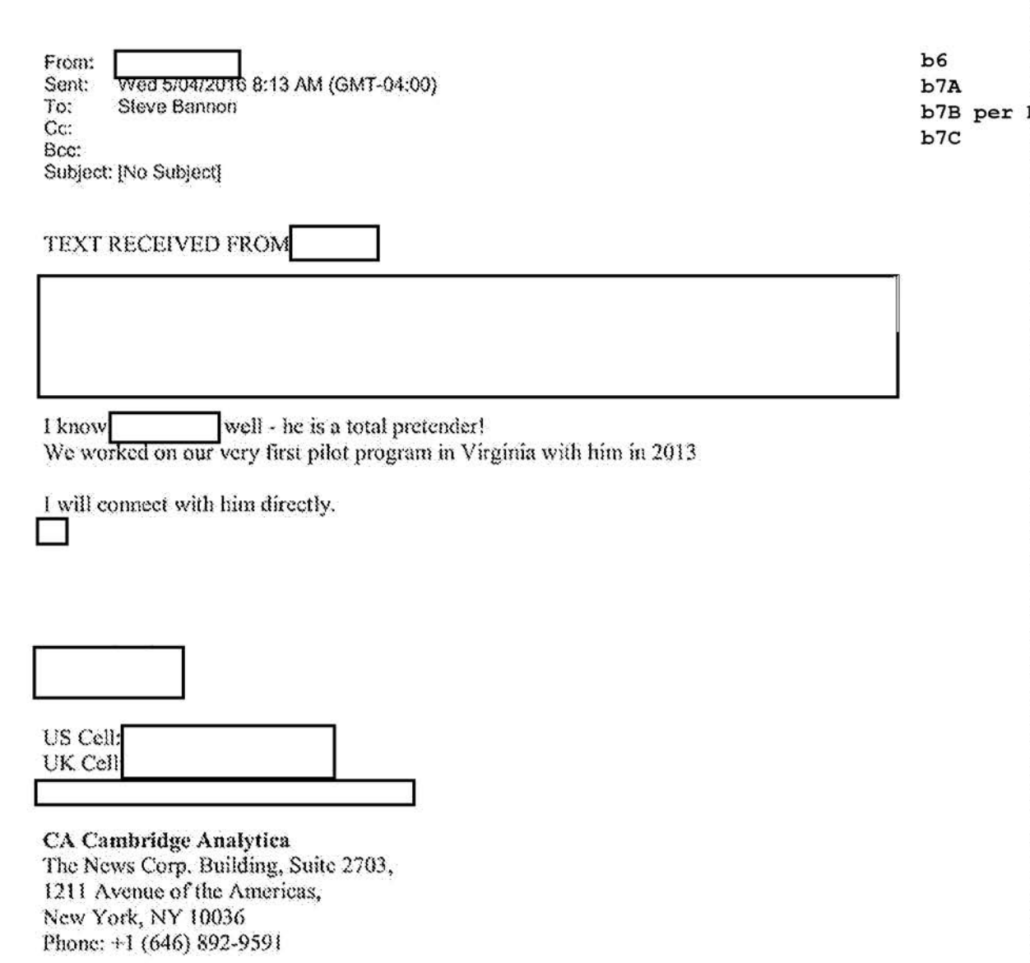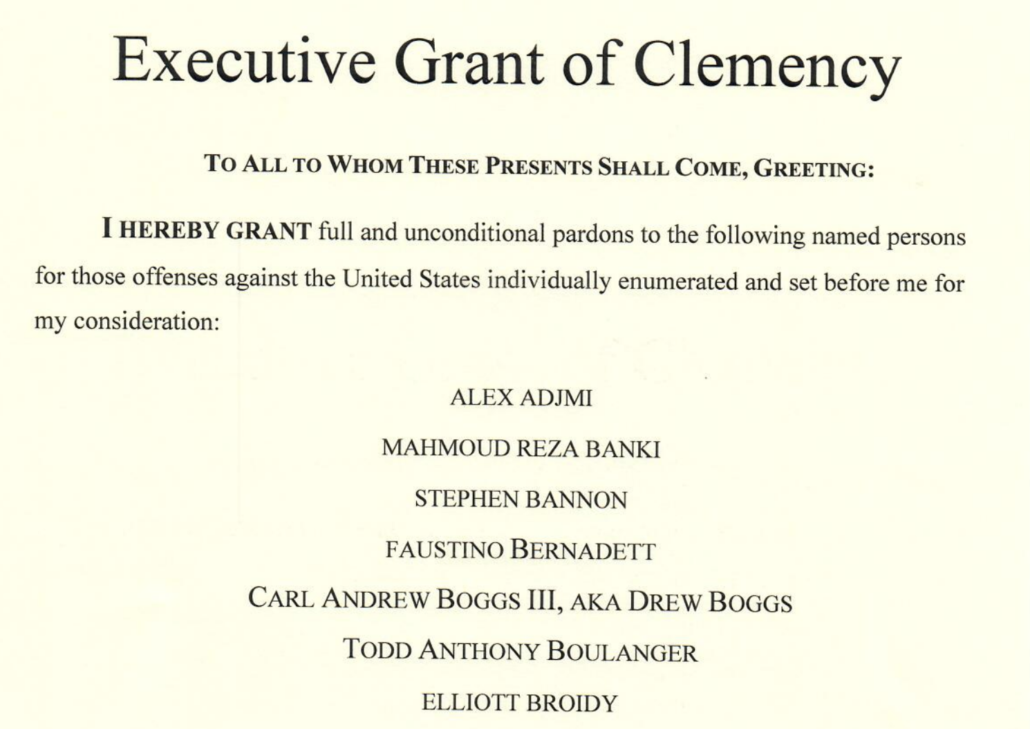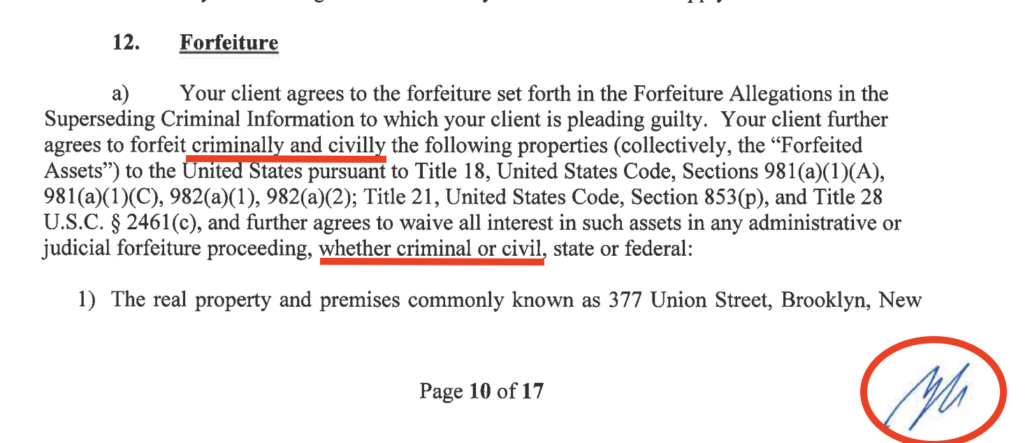Rudy Giuliani’s Support Role in the Mueller Report
As I showed in the Rat-Fucker Rashomon series, it can be tremendously useful to compare how different inquiries into Russian interference in 2016 tell that story. That’s true not just of Roger Stone; it’s also true of Rudy Giuliani.
By the time SSCI finished its Russia Report, the shape of the 2020 Russian influence campaign was evident, and it shows up, in redacted form, in the final report. As part of that discussion, the SSCI Report deals with Rudy at least once in almost entirely redacted passages about the ongoing influence campaign involving Russian assets in Ukraine. That is, it clearly suggests the trajectory led to the influence campaigns that were still active in 2020.
Perhaps because SSCI had the advantage of seeing where Rudy would end up, it also included a few more details about Rudy from earlier on of interest. For example, before Paul Manafort discussed how to win Pennsylvania and how to carve up Ukraine on August 2, 2016, he met with Trump and Rudy Giuliani in Trump Tower.
Among the details SSCI shows of the Trump campaign exploiting documents leaked to WikiLeaks is a citation to an email, dated October 11, 2016, showing Rudy was in that loop.
When Rick Gates was asked what kind of contact Paul Manafort retained with Trump after he was ousted from the campaign, Gates revealed that Manafort told Gates that Rudy Giuliani was helping him place people in Administration positions.
And PsyGroup’s Joel Zamel claimed that Rudy introduced him to Jared Kushner some months after the inauguration; Kushner and Zamel had a meeting at the White House to discuss “human rights issues in the Middle East, Iran, and ‘counter-extremism’.”
Aside from the detail that Manafort was using Rudy as a side channel to influence the White House, those aren’t necessarily momentous details.
Still, those details show that Rudy was a participant in these events during 2016. And yet, Rudy doesn’t show up as such in discussions about 2016 in the Mueller Report. Rather, Rudy shows up exclusively as Trump’s lawyer, floating the pardons in an attempt to get witnesses to lie to cover up what really happened in 2016.
Rudy — who was not yet formally Trump’s personal counsel — and his current defense attorney, Robert Costello, didn’t succeed in getting Michael Cohen to shield Trump.
On or about April 17, 2018, Cohen began speaking with an attorney, Robert Costello, who had a close relationship with Rudolph Giuliani, one of the President’s personal lawyers. 1022 Costello told Cohen that he had a “back channel of communication” to Giuliani, and that Giuliani had said the “channel” was “crucial” and “must be maintained.” 1023 On April 20, 2018, the New York Times published an article about the President’s relationship with and treatment of Cohen. 1024 The President responded with a series of tweets predicting that Cohen would not ” flip” :
The New York Times and a third rate reporter . . . are going out of their way to destroy Michael Cohen and his relationship with me in the hope that he will ‘flip. ‘ They use nonexistent ‘sources’ and a drunk/drugged up loser who hates Michael, a fine person with a wonderful family. Michael is a businessman for his own account/lawyer who I have always liked & respected. Most people will flip if the Government lets them out of trouble, even if it means lying or making up stories. Sorry, I don’t see Michael doing that despite the horrible Witch Hunt and the dishonest media! 1025
In an email that day to Cohen, Costello wrote that he had spoken with Giuliani. 1026 Costello told Cohen the conversation was “Very Very Positive[.] You are ‘loved’ … they are in our corner … . Sleep well tonight[], you have friends in high places.”1027
But Rudy, acting as part of Joint Defense Agreement in the role of Trump’s personal counsel, did succeed in getting Paul Manafort to lie about what happened on August 2 and efforts to carve up Ukraine in the aftermath.
Immediately following the revocation of Manafort’s bail, the President’s personal lawyer, Rudolph Giuliani, gave a series of interviews in which he raised the possibility of a pardon for Manafort. Giuliani told the New York Daily News that “[w]hen the whole thing is over, things might get cleaned up with some presidential pardons.” 856 Giuliani also said in an interview that, although the President should not pardon anyone while the Special Counsel’s investigation was ongoing, “when the investigation is concluded, he’s kind of on his own, right?”857 In a CNN interview two days later, Giuliani said, ” I guess I should clarify this once and for all. . . . The president has issued no pardons in this investigation. The president is not going to issue pardons in this investigation …. When it’s over, hey, he’s the president of the United States. He retains his pardon power. Nobody is taking that away from him.”858 Giuliani rejected the suggestion that his and the President’s comments could signal to defendants that they should not cooperate in a criminal prosecution because a pardon might follow, saying the comments were “certainly not intended that way.”859 Giuliani said the comments only acknowledged that an individual involved in the investigation would not be “excluded from [ a pardon], if in fact the president and his advisors .. . come to the conclusion that you have been treated unfairly.”860 Giuliani observed that pardons were not unusual in political investigations but said, “That doesn’t mean they’re going to happen here. Doesn’t mean that anybody should rely on it. … Big signal is, nobody has been pardoned yet.” 561
[snip]
The President said that flipping was “not fair” and “almost ought to be outlawed.”880 ln response to a question about whether he was considering a pardon for Manafort, the President said, “T have great respect for what he’s done, in terms of what he’s gone through …. He worked for many, many people many, many years, and T would say what he did, some of the charges they threw against him, every consultant, every lobbyist in Washington probably does.”881 Giuliani told journalists that the President “really thinks Manafort has been horribly treated” and that he and the President had discussed the political fallout if the President pardoned Manafort.882 The next day, Giuliani told the Washington Post that the President had asked his lawyers for advice on the possibility of a pardon for Manafort and other aides, and had been counseled against considering a pardon until the investigation concluded.883
On September 14, 2018, Manafort pleaded guilty to charges in the District of Columbia and signed a plea agreement that required him to cooperate with investigators.884 Giuliani was reported to have publicly said that Manafort remained in a joint defense agreement with the President following Manafort’s guilty plea and agreement to cooperate, and that Manafort’s attorneys regularly briefed the President’s lawyers on the topics discussed and the information Manafort had provided in interviews with the Special Counsel’s Office.885 On November 26, 2018, the Special Counsel’s Office disclosed in a public court filing that Manafort had breached his plea agreement by lying about multiple subjects.886 The next day, Giuliani said that the President had been “upset for weeks” about what he considered to be “the un-American, horrible treatment of Manafort.”887
Also, for whatever reason — probably because he had word diarrhea — Rudy provided the best evidence that Trump knowingly lied on his written answers to Mueller when he claimed not to remember the Trump Tower Moscow dangles during the election.
Also in January 2019, Giuliani gave press interviews that appeared to confirm Cohen’s account that the Trump Organization pursued the Trump Tower Moscow project well past January 2016. Giuliani stated that ” it’s our understanding that [discussions about the Trump Moscow project] went on throughout 2016. Weren’t a lot of them, but there were conversations. Can’t be sure of the exact date. But the president can remember having conversations with him about it. The president also remembers-yeah, probably up-could be up to as far as October, November.” 1069
Rudy was treated so persistently as a lawyer in the Mueller Report, but not a participant, that he didn’t even make the Glossary of Referenced Persons.
That’s true even though Rudy did show up in interviews as a topic of interest.
For example, when Mike Flynn was asked on April 25, 2018, just days after Rudy officially became Trump’s defense attorney, who else besides he and Bannon were hunting for Hillary’s missing 33,000 emails, the former Director of Defense Intelligence named Rudy, because he was “a big cyber guy.”
When question[ed] who else might have information about on the email messages, FLYNN mentioned Rudy GIULIANI. GIULIANI was “a big cyber guy” who have a speech on the topic in Tel Aviv. GIULIANI had a ton of contacts and traveled quite a bit with TRUMP (FLYNN surmised approximately half of the time). GIULIANI had a certainty that the emails were out there and available. GIULIANI would have said this directly to TRUMP. The natural response from TRUMP was “why the hell could they not find them?”
After two more questions (about Barbara Ledeen’s efforts), Mueller’s team returned to Rudy. This time, former Director of Defense Intelligence explained that if Rudy said something, you could be sure it was factual.
GIULIANI had contacts at the FBI, though he was pretty “close hold” on who he spoke with there. If GIULIANI said something, you could take it to the bank as factual, FLYNN believed that GIULIANI acted in a manner which indicated had specific knowledge related to the emails. FLYNN reviewed GIULIANI’s speech for Tel Aviv, made some comments, and gave it back to GIULIANI. GIULIANI did not name drop. GIULIANI popped in throughout the campaign to help with certain events. FLYNN did not know if GIULIANI knew Russia hacked the DNC.
Two more questions later, in response to a question about whether Jeff Sessions attempted to find the emails, Flynn brought up Rudy again.
FLYNN was asked whether SESSIONS or CHRISTIE made any efforts to find an answer based on their law enforcement backgrounds. SESSIONS did not make any effort at all. GIULIANI had deeper discussion on the issue with the campaign. CHRISTIE was somewhere between the two in regards to effort. CHRISTIE always seemed to “puff” about what he could do. FLYNN observed that GIULIANI and CHRISTIE had extensive connections and contact in New York. They constantly brought information back to the campaign. They did not do a lot of name dropping but there was a certainty to their information. FLYNN did not remember either of them saying they had contact with WikiLeaks.
Several more questions later, Flynn raised Rudy again in a discussion of whether anyone reached out to other countries for the emails.
Flynn opined that if Russia had them, then China, Iran, and North Korea also had them. Those countries had the cyber capabilities to get them and CLINTON was the Secretary of State. FLYNN also thought hactivist groups operating in the [sic] Ukraine could have them. It was also likely Israel had them. FLYNN did not recall specific discussions on reaching out to these countries to find out what they had. GIULIANI could have reached out to Israel but FLYNN did not know.
In an interview six days later, Mueller’s team asked Flynn more about the role of the guy who had just become Trump’s defense attorney.
FLYNN did not recall Rudy GIULIANI saying specifically what he was doing to learn more about the missing email messages. GIULIANI seemed insightful to FLYNN on knowing when news would break. GIULIANI was working on cyber policy for TRUMP. FLYNN was not sure if GIULIANI got his information from the news or from actual contacts. FLYNN attended a couple of meetings at Trump Tower where GIULIANI was present. GIULIANIs conversations were always that Wikileaks would release the missing email messages, not Russia. FLYNN thought Russia would wait to see who won the election. If CLINTON won, Russia could then use them for leverage over her. Wikileaks claimed to have the desire to put information out in the public to damage CLINTON.
FLYNN did not participate in any conversations with GIULIANI that indicated GIULIANI “cast his net” with his contacts. GIULIANI was one of a number of people around TRUMP’s inner circle. GIULIANI agreed on who was behind the hack but was not really certain. GIULIANI was a close hold guy but might share what he was hearing. FLYNN recently saw a clip that during the campaign, GIULIANI said during an interview that there were more leaks to come. FLYNN recalled that was the kind of thing GIULIANI would say with certainty related to cyber. FLYNN listened to GIULIANI who came across as a judge and made remarks as though they were facts.
I have not done a systematic review of all this (and earlier releases are too redacted to be of much use on such issues). But it’s not just Flynn who had something interesting to say about Rudy. When discussing the Transition (and egregiously downplaying his own role in foreign policy), for example, Steve Bannon described the tension during the Transition because both Jeff Sessions and Rudy wanted to be Secretary of State. “Bannon thought Giuliani would have issues in his confirmation if he was nominated as Secretary of State, however, because of some of his companies and foreign contacts,” Bannon explained, acknowledging even then that Rudy was a foreign influence peddling risk.
Perhaps it’s because, when Rudy became Trump’s defense attorney, it made any inquiry into his role in 2016 awkward. But even though Rudy was a participant in all this, and even though Mike Flynn thought he might be the most likely person to “cast his net” for ways to pursue stolen emails, it’s not clear how aggressively the Mueller team considered what role Rudy had.

